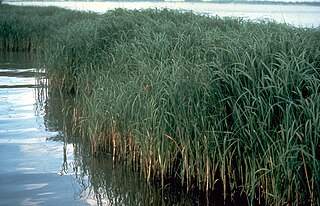
A halophyte is a salt-tolerant plant that grows in soil or waters of high salinity, coming into contact with saline water through its roots or by salt spray, such as in saline semi-deserts, mangrove swamps, marshes and sloughs, and seashores. The word derives from Ancient Greek ἅλας (halas) 'salt' and φυτόν (phyton) 'plant'. Halophytes have different anatomy, physiology and biochemistry than glycophytes. An example of a halophyte is the salt marsh grass Spartina alterniflora. Relatively few plant species are halophytes—perhaps only 2% of all plant species. Information about many of the earth's halophytes can be found in the halophyte database.
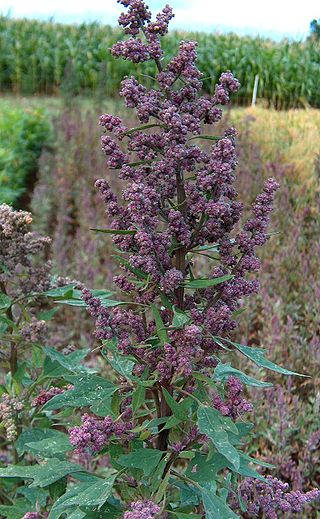
Quinoa is a flowering plant in the amaranth family. It is a herbaceous annual plant grown as a crop primarily for its edible seeds; the seeds are rich in protein, dietary fiber, B vitamins and dietary minerals in amounts greater than in many grains. Quinoa is not a grass but rather a pseudocereal botanically related to spinach and amaranth, and originated in the Andean region of northwestern South America. It was first used to feed livestock 5,200–7,000 years ago, and for human consumption 3,000–4,000 years ago in the Lake Titicaca basin of Peru and Bolivia.
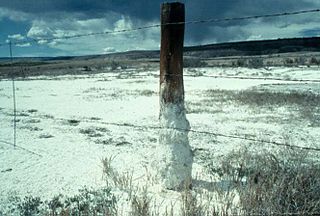
Soil salinity is the salt content in the soil; the process of increasing the salt content is known as salinization. Salts occur naturally within soils and water. Salination can be caused by natural processes such as mineral weathering or by the gradual withdrawal of an ocean. It can also come about through artificial processes such as irrigation and road salt.
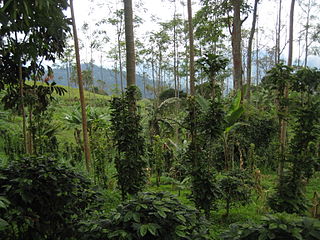
Sustainable agriculture is farming in sustainable ways meeting society's present food and textile needs, without compromising the ability for current or future generations to meet their needs. It can be based on an understanding of ecosystem services. There are many methods to increase the sustainability of agriculture. When developing agriculture within sustainable food systems, it is important to develop flexible business processes and farming practices. Agriculture has an enormous environmental footprint, playing a significant role in causing climate change, water scarcity, water pollution, land degradation, deforestation and other processes; it is simultaneously causing environmental changes and being impacted by these changes. Sustainable agriculture consists of environment friendly methods of farming that allow the production of crops or livestock without causing damage to human or natural systems. It involves preventing adverse effects on soil, water, biodiversity, and surrounding or downstream resources, as well as to those working or living on the farm or in neighboring areas. Elements of sustainable agriculture can include permaculture, agroforestry, mixed farming, multiple cropping, and crop rotation.

CGIAR is a global partnership that unites international organizations engaged in research about food security. CGIAR research aims to reduce rural poverty, increase food security, improve human health and nutrition, and sustainable management of natural resources.
The International Centre of Insect Physiology and Ecology is an international scientific research institute, headquartered in Nairobi, Kenya that works towards improving lives and livelihoods of people in Africa.
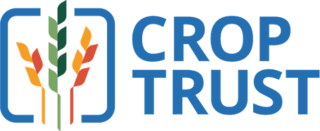
The Crop Trust, officially known as the Global Crop Diversity Trust, is an international nonprofit organization with a secretariat in Bonn, Germany. Its mission is to conserve and make available the world's crop diversity for food security.

Bioversity International is a global research-for-development organization that delivers scientific evidence, management practices and policy options to use and safeguard agricultural biodiversity to attain global food- and nutrition security, working with partners in low-income countries in different regions where agricultural biodiversity can contribute to improved nutrition, resilience, productivity and climate change adaptation. In 2019, Bioversity International joined with the International Center for Tropical Agriculture to "deliver research-based solutions that harness agricultural biodiversity and sustainably transform food systems to improve people's lives". Both institutions are members of the CGIAR, a global research partnership for a food-secure future.
Crop diversity or crop biodiversity is the variety and variability of crops, plants used in agriculture, including their genetic and phenotypic characteristics. It is a subset of a specific element of agricultural biodiversity. Over the past 50 years, there has been a major decline in two components of crop diversity; genetic diversity within each crop and the number of species commonly grown.
Agriculture in the United Arab Emirates, including fishing, was a minor part of the UAE economy in the early 1990s, contributing less than 4 percent of GDP. Since the formation of the UAE, the availability of capital and the demand for fresh produce have encouraged agricultural development. The main farming areas are Digdaga in Ras al-Khaimah. Falaj al Mualla in Umm al Qawain, Wadi adh Dhayd in Sharjah, Al Awir in Dubai and the coastal area of Al Fujairah. Total cultivable land was around 70,000 hectares as of the early 1990s.
Deficit irrigation (DI) is a watering strategy that can be applied by different types of irrigation application methods. The correct application of DI requires thorough understanding of the yield response to water and of the economic impact of reductions in harvest. In regions where water resources are restrictive it can be more profitable for a farmer to maximize crop water productivity instead of maximizing the harvest per unit land. The saved water can be used for other purposes or to irrigate extra units of land. DI is sometimes referred to as incomplete supplemental irrigation or regulated DI.

Climate change is a critical issue in Bangladesh. as the country is one of the most vulnerable to the effects of climate change. In the 2020 edition of Germanwatch's Climate Risk Index, it ranked seventh in the list of countries most affected by climate calamities during the period 1999–2018. Bangladesh's vulnerability to the effects of climate change is due to a combination of geographical factors, such as its flat, low-lying, and delta-exposed topography. and socio-economic factors, including its high population density, levels of poverty, and dependence on agriculture. The impacts and potential threats include sea level rise, temperature rise, food crisis, droughts, floods, and cyclones.
The Central Soil Salinity Research Institute (CSSRI) is an autonomous institute of higher learning, established under the umbrella of Indian Council of Agricultural Research (ICAR) by the Ministry of Agriculture, Government of India for advanced research in the field of soil sciences. The institute is located on Kachawa Road in Karnal, in the state of Haryana, 125 km (78 mi) from the Indian capital of New Delhi.
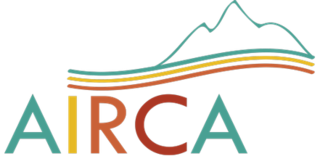
The Association of International Research and Development Centers for Agriculture (AIRCA) is an international, non-profit alliance focused on increasing food security by supporting smallholder agriculture and rural enterprise within healthy, sustainable and climate-smart landscapes.
Food sovereignty is a highly influential idea in Bolivian political discourse. It is incorporated into multiple pieces of Bolivian legislation, including the 2009 constitution drafted underneath president Evo Morales. Food sovereignty fits into Morales' larger goal of the symbolic decolonization of Bolivia. First coined by indigenous and peasant worker advocacy organization Via Campesina, food sovereignty is the right for a state's people to produce and distribute culturally appropriate foods without the impingement of economic pressures created by foreign agribusiness producers. The presence of foreign agribusiness in Bolivia can be traced back to exploitative resource extraction that proliferated in South America with 19th century liberalism. Modern-day wholesale agribusiness production makes competition difficult for Bolivia's small-scale farmers, who often take out high-interest loans and consequently accumulate debt.
The Nordic Genetic Resource Center is a plant, farm animal and forest conservation, gene resource guardian, and sustainable use organization under and primarily financed by the Nordic Council of Ministers, and is headquartered in Alnarp, near Malmö, in southern Sweden. NordGen's primary mission is "securing the broad diversity of genetic resources linked to food and agriculture" through "conservation and sustainable use, solid documentation and information work and international agreements".

The Eastern Region, officially known as Al Ain Region, is one of three Municipal Regions in the Emirate of Abu Dhabi. It forms the southeastern part of the United Arab Emirates. Its main settlement is the eponymous city of Al Ain, located on the country's border with Oman, about 160 km (99 mi) from the city of Abu Dhabi, the capital of the Emirate and country. Compared to the Western Region, it is also a rather remote region of the Emirate, but smaller by area, and is not known to hold reserves of gas or petroleum, but is agriculturally important.
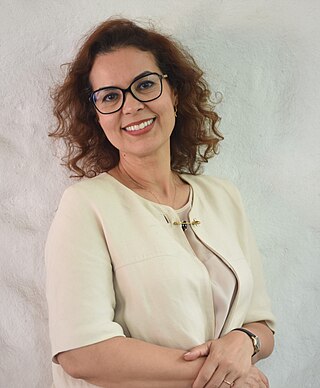
Ismahane Elouafi is the Executive Managing Director of CGIAR. Formerly Chief Scientist of the Food and Agriculture Organization of the United Nations (FAO), she is ranked among the 20 most influential women in science in the Islamic world and is internationally known for her work on promoting neglected and underutilized crops, use of non-fresh water in agriculture, and empowerment of women in science.
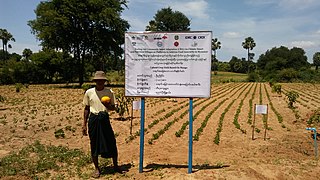
Climate-smart agriculture (CSA) is a set of farming methods that has three main objectives with regards to climate change. Firstly, they use adaptation methods to respond to the effects of climate change on agriculture. Secondly, they aim to increase agricultural productivity and to ensure food security for a growing world population. Thirdly, they try to reduce greenhouse gas emissions from agriculture as much as possible. Climate-smart agriculture works as an integrated approach to managing land. This approach helps farmers to adapt their agricultural methods to the effects of climate change.

Biosaline agriculture is the production and growth of plants in saline rich groundwater and/or soil. In water scarce locations, salinity poses a serious threat to agriculture due to its toxicity to most plants. Abiotic stressors such as salinity, extreme temperatures, and drought make plant growth difficult in many climate regions. Integration of biosaline solutions is becoming necessary in arid and semiarid climates where freshwater abundance is low and seawater is ample. Salt-tolerant plants that flourish in high-salinity conditions are called halophytes. Halophyte implementation has the potential to restore salt-rich environments, provide for global food demands, produce medicine and biofuels, and conserve fresh water.


















